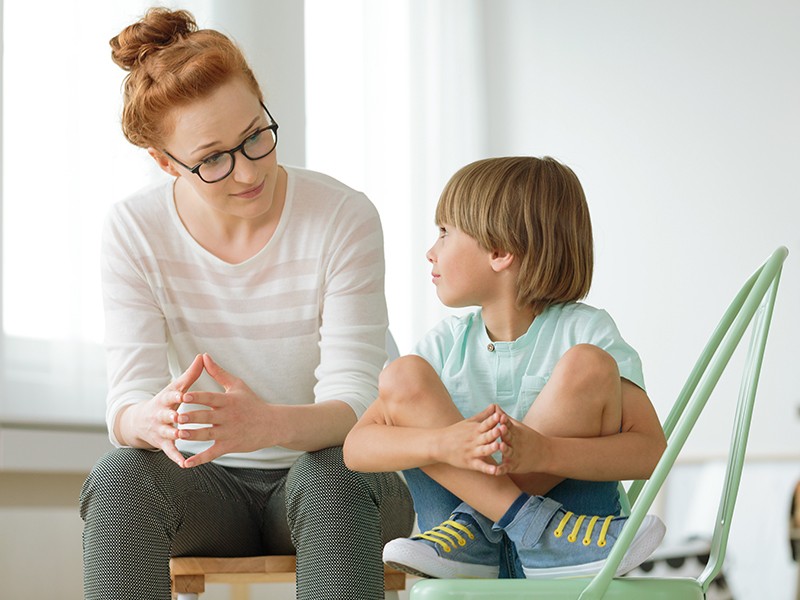clinical psychology – mental illnesses
How useful are preliminary examinations in children for mental illnesses??
02/16/2014 Researchers at Adelaide University show that screening for mental illness in children is appallingly inaccurate.

In the study, the parents of 2,100 children (ages 4-5 years) completed a symptom checklist. The scientists then compared this data two years later with the psychological problems identified by the children’s teachers.
The findings were devastating: only about 25% of the children considered by the teachers "psychological problems" at the age of 6-7 had been correctly classified in the risk of mental illness category at the age of 4-5 due to the parent reports.
"75% of the children rated as "at risk" showed no psychological abnormalities two years later. This demonstrates the difficulty in such screening procedures in clearly identifying individual children who will experience many problems two years later in the first few years at school", said study leader Alyssa Sawyer.
75% false positives mean that screening procedures for mental illnesses in preschool children urgently need to be improved, or at least should not be relied on.
Source: University of Adelaide / Australian and New Zealand Journal of Psychiatry, Jan. 2014
Children with chronic physical illnesses often show signs of psychological complaints
Jan 14, 2018 Children often show signs of psychological complaints or disorders shortly after they have been diagnosed with a chronic physical illness, according to an in BMJ Open published pilot study.
Researchers at Waterloo University interviewed children and adolescents aged six to 16 years, all within a month of being diagnosed with asthma, food allergy, epilepsy, diabetes, or juvenile arthritis.
According to the parents’ answers to a standardized interview, 58 percent of the children showed a positive screening for at least one mental disorder. This is the first study of its kind to examine children with different physical conditions and so soon after diagnosis, the researchers write.
These results show that the risk of mental disorders in children with different physical conditions is relatively the same, said study author Prof. Mark Ferro.
Decline in quality of life
Regardless of their condition, children with physical and psychological problems showed a significant decline in their quality of life within the first six months after diagnosis, which indicates an early need for psychological help.
Physical well-being and academic performance also deteriorated within 6 months after diagnosis. The psychosocial characteristics of the parents did not seem to play a role in this study.
Six months after diagnosis, the number of children with signs of a mental disorder dropped slightly to 42 percent.
anxiety
Anxiety disorders were most common, including separation anxiety, generalized anxiety, and phobias.
The researchers found that age and gender had no effect on the results.
A subset of children provided information about their own mental health. And while 58 percent of parents reported that their children showed signs of a mental health problem, only 18 percent of children reported it. This result speaks for the need for health professionals to consider multiple perspectives when assessing children’s mental health, the researchers say.
The findings must now be replicated from other studies.
© PSYLEX.de – Source: University of Waterloo; BMJ Open – doi: 10.1136 / bmjopen-2017-019011; Jan. 2018
Greater risk to mental health after serious injuries
May 7, 2018 There is no doubt that serious injuries can be psychologically stressful for families. Little is known about the effects of these injuries on children’s mental health.

Image: mintchipdesigns
A new one in the journal The Journal of Pediatrics published study examined mental health and the adolescent psychosocial functions after being hospitalized for an injury.
The study evaluated data from 0-18 year-old children and adolescents hospitalized at Nationwide Children’s from June 2005 to May 2015 for accidental injuries. All children in this study were enrolled in the hospital’s Managed Medicaid program, which enabled basic mental health assessment.
63% more diagnoses
The researchers found that children admitted to hospital because of an injury received an average of 63% more diagnoses of mental illness and 155% more common psychiatric drugs to treat a mental illness.
Burns and head injuries
Children under four years of age with burns and adolescents of all ages with head injuries were most at risk for new diagnoses of a mental disorder after an injury.
The increase in the likelihood of occurrence was especially in the case of stress-related diseases how
- adjustment disorders,
- Disorders of social behavior,
- eating disorder,
- Learning disorders and
- Record sleep disorders.
The researchers around Dr. Julie Leonard of the Center for Pediatric Trauma Research emphasizes the importance of following up on mental symptoms after serious injuries.
© PSYLEX.de – source: The Journal of Pediatrics; Nationwide Children’s Hospital
What experience have you had with it? write us.
RELATED ITEMS
-

Mental illnesses in children and adolescents
Depression in children and adolescents: The range of mental illnesses among young people is large – just like the number of people affected….
-

Mental disorders in children and adolescents: symptoms and warning signals
Warning signals for possibly existing illness 04/10/2015 by Dr. Christine Amrhein Mental illnesses are not common in children and adolescents…
-

Mental illnesses in children, dak fit!
Developmental disorders, computer addiction, ADHD: According to the DAK Children and Youth Report, 26 percent of all children and adolescents in 2016 were one…
-

Reactive attachment disorder in children – psylex
Psychological problems – relationship problems Risk factors: Mental disorders in parents increase the risk of reactive attachment disorders in children…
